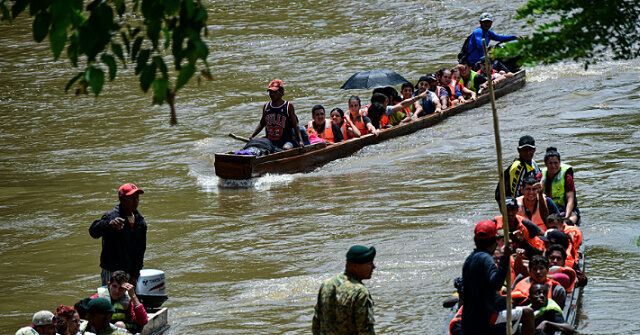Panama’s Migrant Authority registered a surge of U.S.-bound migrants passing through the Darién Gap jungle trail in September, largely driven by Venezuelans fleeing from their country in the wake of the fraudulent July 28 sham presidential election, the Associated Press (AP) reported over the weekend.
The surge recorded in September follows the launch of efforts led by the administration of President José Raúl Mulino to curb the flow of migrants passing through Panama’s territory en route to the United States after taking office in July.
The Darién Gap is a dangerous jungle trail that Panama shares with Colombia and the only land bridge that connects South and Central America. While an overwhelming majority of the hundreds of thousands of migrants who have passed through the Darién Gap are Venezuelan nationals, migrants from other South American nations such as Colombia and Ecuador, and Asian nations such as China, continue to pass through the trail en route to the United States. In 2023, Panama’s Migrant Authority documented 520,085 migrants crossing the Darién Gap.
According to the authority’s most recent statistics, 25,111 migrants passed through the Darién Gap in September, a 51.23-percent increase from the 16,603 recorded in August. Venezuelan nationals accounted for 78.83 percent of September’s total Darién crossings, totaling 19,800 registered encounters, up from the 11,733 logged in August.
Nearly eight million Venezuelans have fled their country over the past decade as a result of the collapse of socialism in their country. The Venezuelan migrant crisis, described as the worst migrant crisis in the Western Hemisphere, is only comparable in size to that of Syria and Ukraine, notable since Venezuela has not been in a state of war in recent history.
“The crackdown in the wake of the July 28, 2024 elections in Venezuela has already led to increased emigration,” Refugees International, a Washington-based NGO, said in a report shared with the Associated Press.
Venezuela’s socialist regime held a fraudulent election in July 28 in which dictator Nicolás Maduro — who occupied 13 different positions in the ballot — “competed” against a handful of handpicked “rivals” and Edmundo González, a 75-year-old former diplomat and the only genuine opposition candidate allowed to run.
Maduro, who controls all Venezuelan institutions including the nation’s electoral authority, insists he “won” the election. The opposition has presented evidence, local voter tallies, that suggests González defeated the dictator in a landslide. The dictator’s fraudulent victory claims prompted nationwide protests in Venezuela that Maduro responded to with a brutal persecution campaign that, according to U.N. estimates, has left 27 dead and more than 2,400 detained so far. Among those imprisoned are dozens of children who have been reportedly tortured and charged with “terrorism.”
The Maduro regime has also persecuted dissidents through the use of smartphone applications and established “reeducation camps” for dissidents. Maduro commissioned their construction in two of the country’s prisons that the ruling socialists emptied of its inmates last year. González ultimately fled to Spain in September after the Maduro regime issued an arrest warrant for him on election-related criminal charges.
Other countries in the region such as neighboring Brazil have also experienced a noticeable surge of Venezuelan migrants arriving to its territory on a daily basis in recent weeks following the fraudulent July election.
In early September, far-left President Luiz Inácio Lula da Silva, a longtime ally of the Venezuelan socialist regime, said that his administration would continue receiving migrants fleeing from the Maduro regime but hoped that Venezuela “returns to normal” soon so the migrants can return “as soon as possible.”
In his speech at the United Nations General Assembly in September, Panamanian President Mulino declared the flow of U.S.-bound migrants passing through his country an “immense global problem.” Migrants pass through his country in such large numbers, he said, that the “United States border” is functionally in Panama. Mulino called for joint international efforts to curb the flow of migrants, stressing that his country does not have the resources to solve the crisis on its own.
Upon taking office in July, Mulino’s administration began efforts to limit the flow of migrants passing through the Darién Gap. Some of the recently implemented policies include the installation of barbed wire fences across the jungle trail’s more common routes, dismantling “VIP” route services used by Chinese migrants, and signing a deal with the United States to launch U.S.-funded deportation flights.
The Associated Press stated in its report Panama is not deporting Venezuelans on those flights because Panama is among the several countries that the Maduro regime broke diplomatic ties with after it refused to recognize the socialist dictator’s electoral “victory.”
Christian K. Caruzo is a Venezuelan writer and documents life under socialism. You can follow him on Twitter here.



